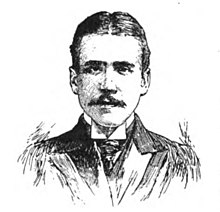Stephen Bonsal
| Stephen Bonsal | |
|---|---|

Sketch of Stephen Bonsal 1898
|
|
| Born |
March 29, 1865 Baltimore, Maryland, United States |
| Died | June 8, 1951 (aged 86) |
| Nationality | American |
| Occupation | journalist, war correspondent, diplomat, translator |
| Years active | 1885–1951 |
Stephen Bonsal (March 29, 1865 – June 8, 1951) was an American journalist, war correspondent, author, diplomat and translator, who won the 1945 Pulitzer Prize for History.
Bonsal was born in Baltimore, Maryland, in 1865. He was educated at St. Paul's School in Concord, New Hampshire. He continued his studies in Heidelberg, Bonn, and Vienna. He married Henrietta Fairfax Morris in March 1900. Bonsal traveled extensively. He claimed that he had visited all the countries of Europe, Asia (with the exception of Persia), and South America.
Bonsal was later a special correspondent of the New York Herald (1885–1907), reporting the development of military conflicts including:
He was a foreign correspondent for the New York Times in 1910–1911.
In 1891-1896, Bonsal served as secretary and chargé-d'affaire of the US diplomatic missions in Beijing, Seoul and Tokyo. He also served for at short time at the U.S. embassy in Madrid.
During World War I, Bonsal served in the American Expeditionary Forces with the rank of lieutenant colonel. Afterwards, he was President Woodrow Wilson's private translator during the 1919 Peace Conference in Paris.
Unfinished Business (1944), a diary describing his experiences during the Paris Peace Treaty negotiations, describing all the Allied infighting and waxing lyrical about the plight of the wounded veterans and their families won him the 1945 Pulitzer Prize for History.
"No one else has presented the plight of the plain people of Europe, in relation to the strained secrecy of the Conference, and few have written of their agony as does Colonel Bonsal in terms so hardheaded and so poignant." (Time Magazine)
...
Wikipedia
